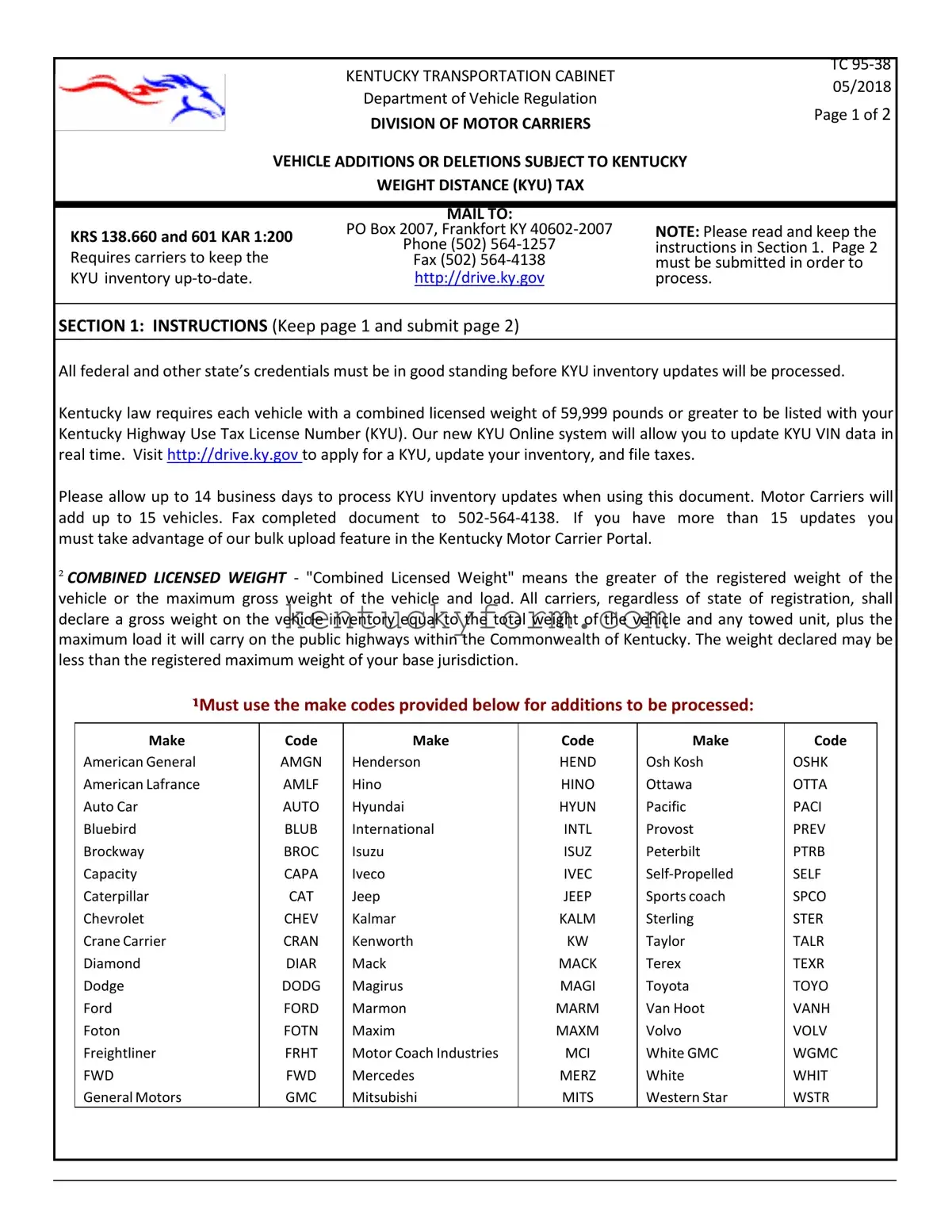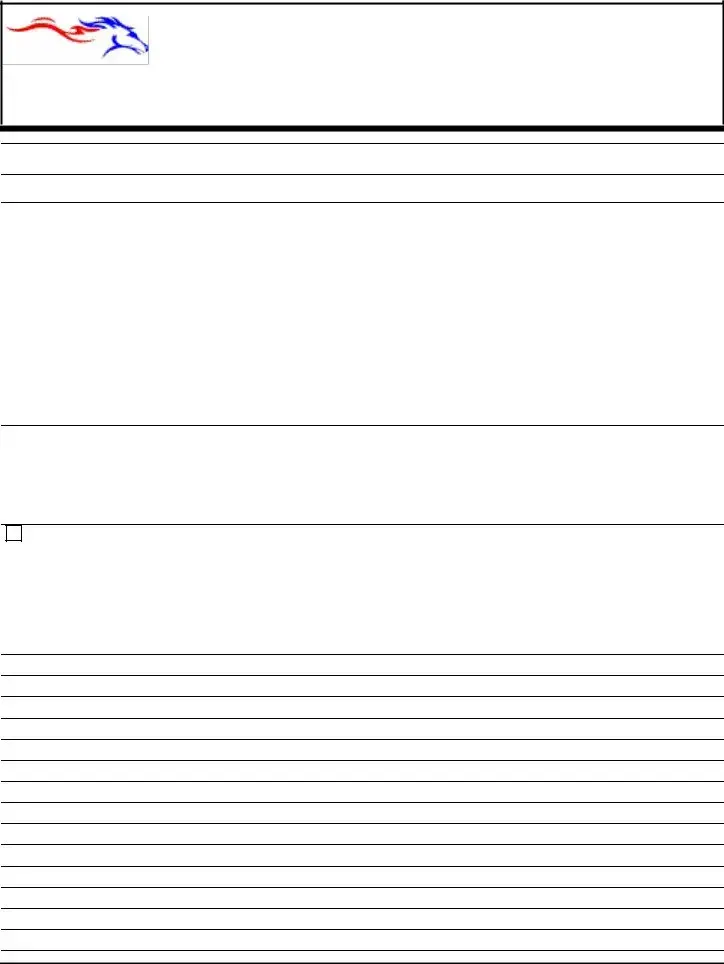|
|
|
KENTUCKY TRANSPORTATION CABINET |
TC 95-38 |
|
|
|
05/2018 |
|
|
|
Department of Vehicle Regulation |
|
|
|
Page 1 of 2 |
|
|
|
DIVISION OF MOTOR CARRIERS |
|
|
|
|
|
|
VEHICLE ADDITIONS OR DELETIONS SUBJECT TO KENTUCKY |
|
|
|
WEIGHT DISTANCE (KYU) TAX |
|
|
|
|
|
|
|
|
|
|
|
|
|
|
MAIL TO: |
|
|
KRS 138.660 and 601 KAR 1:200 |
PO Box 2007, Frankfort KY 40602-2007 |
NOTE: Please read and keep the |
|
Phone (502) 564-1257 |
instructions in Section 1. Page 2 |
|
Requires carriers to keep the |
|
|
|
Fax (502) 564-4138 |
must be submitted in order to |
|
KYU inventory up-to-date. |
|
http://drive.ky.gov |
process. |
SECTION 1: INSTRUCTIONS (Keep page 1 and submit page 2)
All federal and other state’s credentials must be in good standing before KYU inventory updates will be processed.
Kentucky law requires each vehicle with a combined licensed weight of 59,999 pounds or greater to be listed with your Kentucky Highway Use Tax License Number (KYU). Our new KYU Online system will allow you to update KYU VIN data in real time. Visit http://drive.ky.gov to apply for a KYU, update your inventory, and file taxes.
Please allow up to 14 business days to process KYU inventory updates when using this document. Motor Carriers will add up to 15 vehicles. Fax completed document to 502-564-4138. If you have more than 15 updates you must take advantage of our bulk upload feature in the Kentucky Motor Carrier Portal.
²COMBINED LICENSED WEIGHT - "Combined Licensed Weight" means the greater of the registered weight of the vehicle or the maximum gross weight of the vehicle and load. All carriers, regardless of state of registration, shall declare a gross weight on the vehicle inventory equal to the total weight of the vehicle and any towed unit, plus the maximum load it will carry on the public highways within the Commonwealth of Kentucky. The weight declared may be less than the registered maximum weight of your base jurisdiction.
¹Must use the make codes provided below for additions to be processed:
Make |
Code |
Make |
Code |
Make |
Code |
American General |
AMGN |
Henderson |
HEND |
Osh Kosh |
OSHK |
American Lafrance |
AMLF |
Hino |
HINO |
Ottawa |
OTTA |
Auto Car |
AUTO |
Hyundai |
HYUN |
Pacific |
PACI |
Bluebird |
BLUB |
International |
INTL |
Provost |
PREV |
Brockway |
BROC |
Isuzu |
ISUZ |
Peterbilt |
PTRB |
Capacity |
CAPA |
Iveco |
IVEC |
Self-Propelled |
SELF |
Caterpillar |
CAT |
Jeep |
JEEP |
Sports coach |
SPCO |
Chevrolet |
CHEV |
Kalmar |
KALM |
Sterling |
STER |
Crane Carrier |
CRAN |
Kenworth |
KW |
Taylor |
TALR |
Diamond |
DIAR |
Mack |
MACK |
Terex |
TEXR |
Dodge |
DODG |
Magirus |
MAGI |
Toyota |
TOYO |
Ford |
FORD |
Marmon |
MARM |
Van Hoot |
VANH |
Foton |
FOTN |
Maxim |
MAXM |
Volvo |
VOLV |
Freightliner |
FRHT |
Motor Coach Industries |
MCI |
White GMC |
WGMC |
FWD |
FWD |
Mercedes |
MERZ |
White |
WHIT |
General Motors |
GMC |
Mitsubishi |
MITS |
Western Star |
WSTR |
KENTUCKY TRANSPORTATION CABINET
Department of Vehicle Regulation
DIVISION OF MOTOR CARRIERS
VEHICLE ADDITIONS OR DELETIONS SUBJECT TO KENTUCKY
WEIGHT DISTANCE (KYU) TAX
SECTION 2: COMPANY INFORMATION
Company Name:
Address:
City |
|
|
|
State |
ZIP |
|
|
|
|
|
|
|
|
Print Name of person completing form: |
|
|
Phone: |
|
|
|
|
|
|
|
Company Email: |
|
|
|
|
|
|
|
|
|
|
|
SECTION 3: VEHICLE |
|
INVENTORY |
|
|
|
|
|
|
|
|
|
|
|
|
|
|
|
KYU# (required) |
|
USDOT# |
KYTC# |
|
Date: |
|
|
|
|
|
|
|
IMPORTANT
ALL FIELDS BELOW ARE REQUIRED TO UPDATE YOUR VEHICLE INVENTORY.
TEMPORARY PLATE NUMBERS ARE NOT VALID.
INCOMPLETE FORMS WILL BE RETURNED.
TYPE |
|
Do not combine additions and deletions. A separate TC 95-38, must be submitted for |
ADD |
DELETE |
each. Do not declare weights in excess of 80,000 pounds or less than 60,000 pounds. |
|
|
|
|
|
|
|
|
|
|
|
|
|
|
|
|
|
|
|
|
|
|
|
|
|
|
|
|
|
|
Title |
|
State |
|
|
|
|
Model |
|
²Combined |
|
|
Vehicle Identification |
Number |
|
Year |
¹Make |
Licensed |
Number |
|
Registered |
Plate # |
(Full 17-digit VIN for newe |
r vehicles) |
Unit # |
(4 digits) |
(code) |
Weight |
|
|
|
|
|
|
|
|
|
|
1.
2.
3.
4.
5.
6.
7.
8.
9.
10.
11.
12.
13.
14.
15.



